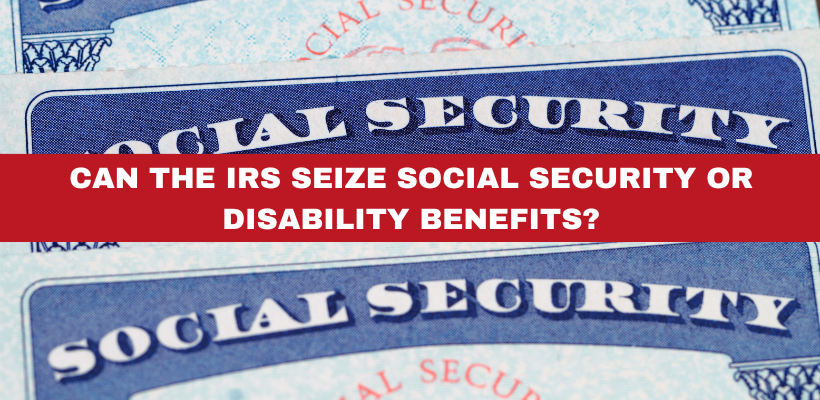One of the biggest concerns for taxpayers dealing with unpaid taxes and tax debt is whether the IRS can garnish their Social Security payments or disability benefits. By knowing the extent of the IRS’s authority and how it applies to federal benefits can help you plan your next steps if you find yourself dealing with tax debt.
When it comes to satisfying tax debt, the IRS has actually been granted significant power to make it happen. In addition to issuing liens against your property, the agency can levy wages and bank accounts. Notably, the IRS also has the ability to garnish certain federal benefits through the Federal Payment Levy Program (FPLP). This means that some government-issued payments may be subject to levy if you have an outstanding tax debt.
Social Security benefits
Under the FPLP, the IRS can garnish a portion of your Social Security retirement benefits. The law generally limits this garnishment to 15% of your monthly benefit. However, this levy will not automatically kick in the moment you owe taxes. First, the IRS must send you a notice alerting you to the debt and proposing a levy action. If you fail to arrange a payment plan or otherwise resolve your debt, the IRS may then proceed with garnishment.
It’s important to remember that 15% garnishment of Social Security benefits can still significantly affect your monthly income. If you are living on a fixed budget, losing a portion of these funds can be financially devastating. However, you may have options to stop or reduce a levy, including requesting a Collection Due Process (CDP) hearing, applying for Currently Not Collectible status, or negotiating an Offer in Compromise.
Supplemental Security Income (SSI)
Supplemental Security Income (SSI) is a needs-based program designed to help those who are elderly, blind, or disabled and have little to no income or resources. Because it is purely a welfare benefit rather than an earned benefit, SSI is not subject to levy by the IRS. This means that if you only receive SSI and do not have any other source of income, the IRS should not garnish these payments to settle your tax debt.
Social Security Disability Insurance (SSDI)
Social Security Disability Insurance (SSDI) can be a bit more complex. In general, SSDI benefits can be garnished under the same rules that apply to Social Security retirement benefits. This means that up to 15% of your SSDI payment could be withheld to satisfy a tax debt. However, if you also receive SSI in addition to SSDI, the SSI portion remains protected.
Other Disability Payments
Not all disability benefits come directly from the Social Security Administration. Some individuals receive benefits through private insurers, state programs, or the Department of Veterans Affairs (VA). The garnishment rules for these vary:
- Private Disability Insurance: The IRS can typically levy the portion of payments that exceed your basic living expenses, though the specifics may vary by policy and state law.
- VA Benefits: Generally, service-connected disability benefits from the VA are protected from levy in most situations. However, some exceptions may apply.
Final Thoughts
Yes, the IRS can garnish certain Social Security payments and disability benefits, but the extent of garnishment and the types of benefits affected vary. If you’re facing possible levy action, it’s wise to explore the options available for protecting your income. By being proactive, like setting up a payment plan, seeking hardship relief, or challenging the levy, you may be able to prevent severe financial strain. If you are in doubt, consult a qualified tax professional to determine the best course of action for your situation.







 Steven N. Klitzner, P.A. is a tax attorney based in Miami, Florida. He has been practicing tax law for over 40 years, and currently holds a 10.0 rating by Avvo. Mr. Klitzner was appointed to the IRS Service Advisory Council in 2021 and is...
Steven N. Klitzner, P.A. is a tax attorney based in Miami, Florida. He has been practicing tax law for over 40 years, and currently holds a 10.0 rating by Avvo. Mr. Klitzner was appointed to the IRS Service Advisory Council in 2021 and is... 





